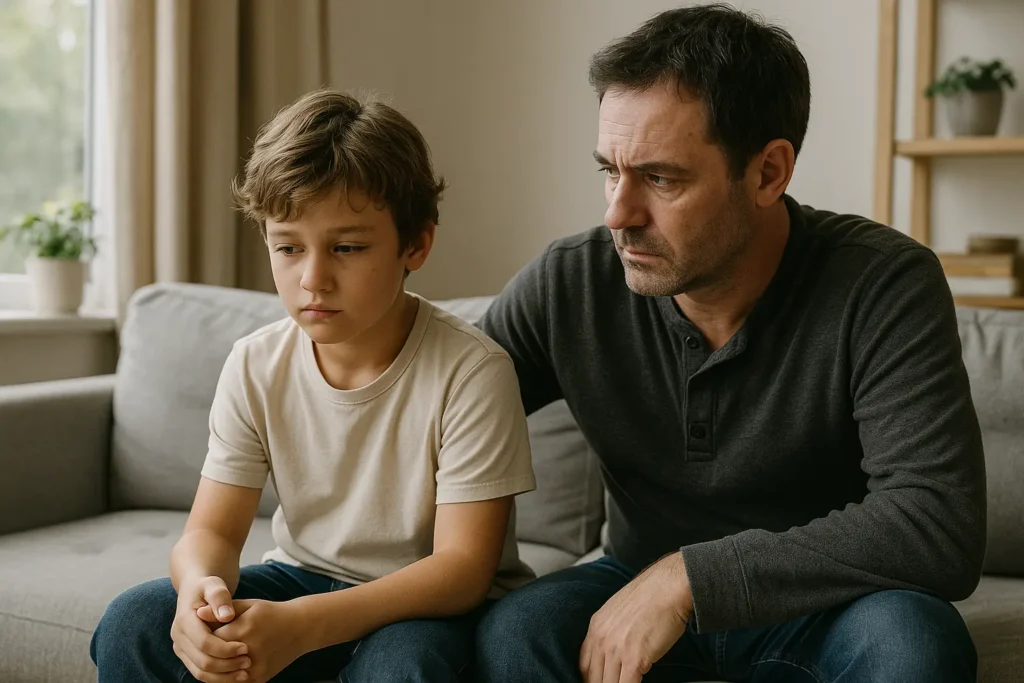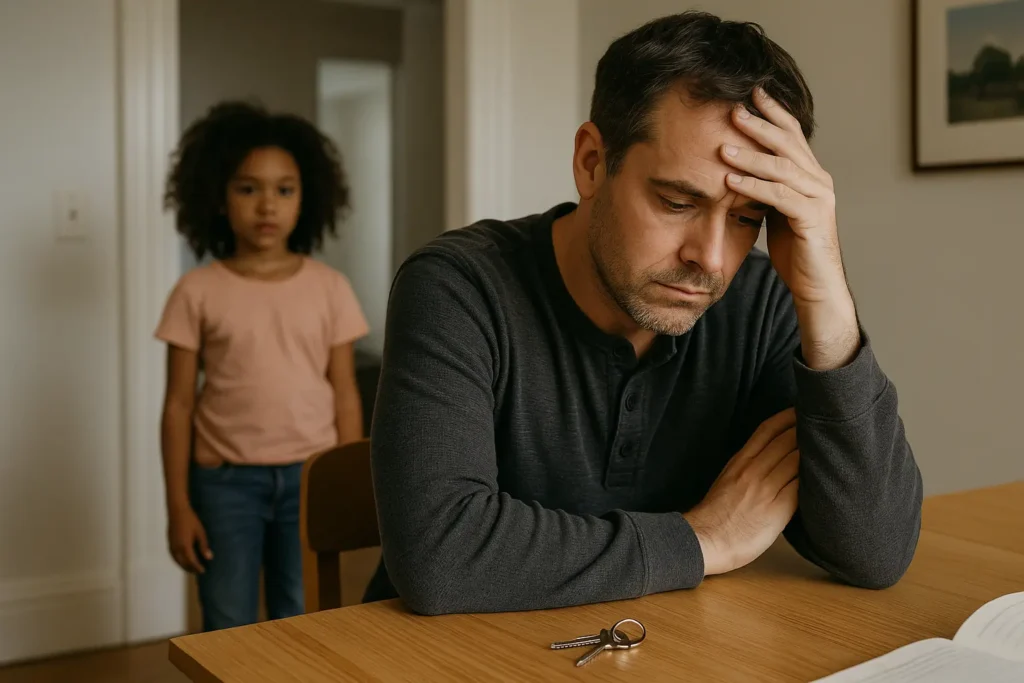
Can a father lose custody is a question that troubles many dads during divorce or separation. Courts do not remove custody rights without cause, but certain actions or circumstances can put those rights at risk. Judges always focus on the child’s safety and stability, which means a father’s behavior, involvement, and ability to provide consistent care play a major role in the outcome.
The Legal Standard in Custody Cases
Courts base custody decisions on what benefits the child, not on a parent’s gender. This standard applies to fathers and mothers equally. Judges consider who provides stability, who meets emotional and physical needs, and which parent supports a healthy relationship with the other parent. Fathers do not start with fewer rights, but they may lose custody if the court finds evidence that affects the child’s welfare.
Common Reasons Fathers Lose Custody
Several issues can lead to a father losing custody. These reasons often connect to a child’s safety, stability, or emotional health.
History of Abuse or Neglect
If a father has a documented history of physical, emotional, or sexual abuse, courts act to protect the child. Neglect, such as failing to provide food, shelter, or medical care, also raises concerns. Even a single incident can affect custody decisions.
Substance Abuse
Drug or alcohol abuse impacts a father’s ability to provide safe and stable care. Judges may order supervised visitation or restrict custody until the father completes treatment and shows improvement.
Domestic Violence
Violence toward a partner, even if not directed at the child, influences custody rulings. Courts view exposure to domestic violence as harmful to children. A father with a record of domestic violence may face limits on custody or visitation.
Criminal Activity
Serious criminal behavior, especially offenses involving violence, theft, or child endangerment, may cost a father custody. Judges prioritize safety, and criminal history weighs heavily in decisions.
Lack of Involvement
Fathers who show little interest in their child’s life risk losing custody. Courts evaluate patterns of involvement, such as school participation, medical care, and daily routines. A father who avoids responsibilities or fails to bond with the child may be considered less capable of providing stability.
Interference with the Other Parent’s Rights
Judges expect parents to support the child’s relationship with the other parent. Fathers who interfere with visitation, speak negatively about the mother, or discourage contact may face custody restrictions. Courts favor cooperation over conflict.

How Fathers Can Protect Custody Rights
Fathers concerned about losing custody can take steps to show they support the child’s well-being. Judges pay attention to consistent actions that reflect responsibility and involvement.
Stay Active in the Child’s Life
Attending school events, medical appointments, and extracurricular activities demonstrates commitment. Regular involvement builds stronger bonds and shows reliability.
Provide a Safe Home Environment
A stable residence, free of hazards or conflict, strengthens a father’s case. Courts look for clean, secure, and supportive living conditions.
Maintain Positive Co-Parenting
Respecting the other parent’s role matters in custody decisions. Fathers who communicate effectively and cooperate with the mother show that they prioritize the child’s needs.
Avoid Negative Behavior
Staying away from substance abuse, violence, or criminal behavior protects custody rights. Judges favor parents who model safe and healthy conduct.
Document Involvement
Keeping records of visits, school meetings, and expenses related to the child can support a father’s case. Documentation provides clear evidence of active parenting.
Misconceptions About Fathers and Custody
Fathers often believe courts automatically favor mothers. While past cases may have leaned that way, modern courts stress equal consideration. The key lies in the evidence presented and the father’s ability to show active parenting.
Another misconception is that losing primary custody means losing all rights. Even if the mother receives primary custody, fathers often retain visitation and decision-making rights. Courts aim to maintain relationships with both parents whenever safe and possible.

Custody Modifications and Fathers
Custody orders can change over time. If a father loses custody due to past issues, he may seek modification after showing improvement. For example, completing rehabilitation, maintaining steady employment, or resolving criminal matters can strengthen a request for more custody or visitation.
Courts require a material and substantial change in circumstances to consider modification. Fathers who improve their situation can petition for more involvement as long as it serves the child’s best interests.
Supervised Visitation as an Alternative
In cases where full custody poses risks, courts may allow supervised visitation. This arrangement lets fathers maintain contact with their children while protecting safety. Supervised visits may take place at a designated center or with a trusted family member.
Though supervised visitation limits independence, it often serves as a stepping stone. Fathers who show consistent, safe behavior during visits may later receive expanded rights.
The Importance of Legal Representation
Custody battles involve complex legal rules and emotional stress. Fathers who face possible loss of custody benefit from legal guidance. Attorneys help present evidence, highlight involvement, and counter false accusations. They also make sure the court hears the father’s perspective fully.
Fathers and Child Support
Losing custody does not end financial responsibility. Fathers remain obligated to pay child support if ordered by the court. Support helps cover food, housing, education, and medical expenses. Judges consider failure to pay support negatively, but support payments alone do not guarantee custody. Active involvement still matters.
The Child’s Voice in Custody Cases
Older children sometimes express preferences during custody disputes. In Texas, judges may interview children privately to understand their wishes. While the child’s voice does not decide the case, it provides insight. Fathers who build strong, positive relationships increase the likelihood that children express comfort with their involvement.
Practical Steps for Fathers Worried About Custody
Fathers can act early to strengthen their role and avoid losing custody.
- Maintain regular contact and communication with the child.
- Keep living conditions stable and supportive.
- Avoid conflict with the other parent in front of the child.
- Attend school, medical, and extracurricular activities consistently.
- Follow all court orders related to custody and support.
These steps show responsibility and commitment, which judges value in custody decisions.
Conclusion
A father can lose custody under certain circumstances, but courts do not remove rights without strong reasons. Issues such as abuse, neglect, substance abuse, or lack of involvement may shift custody to the other parent. Fathers who remain active, provide stable homes, and cooperate with the other parent often keep strong roles in their children’s lives.
Losing custody does not always mean losing all contact. Fathers may still receive visitation and decision-making rights, and they can work toward modification in the future. The focus of the court remains the same in every case: protecting the best interests of the child while supporting parental involvement whenever possible.

Ebook
- How Can a Father Get Full Custody in Texas State? A Practical Guide
- Avoiding Critical Fathers Rights Mistakes in Texas Custody Cases
- Top Factors That Help Fathers Win Full Custody in Texas
- Does anyone pay child support in joint custody?
- The Reality of Child Custody: Joint Managing Conservatorships in Texas
- What does being a joint managing conservator mean in a Texas family law case?
- Texas courts prefer to award parents joint custody in family law cases
- Joint Custody and Child Support in your Texas divorce
- Do I Have to Pay Child Support if I Have Joint Custody of My Child in Texas?
- Joint Managing Conservators in a Child Custody Case in Texas?
- Methods of communication for divorced parents
- Navigating Joint Custody: The Power of Flexibility and Patience

 If you want to know more about what you can do, CLICK the button below to get your FREE E-book: “Child Custody E-Book”
If you want to know more about what you can do, CLICK the button below to get your FREE E-book: “Child Custody E-Book”


